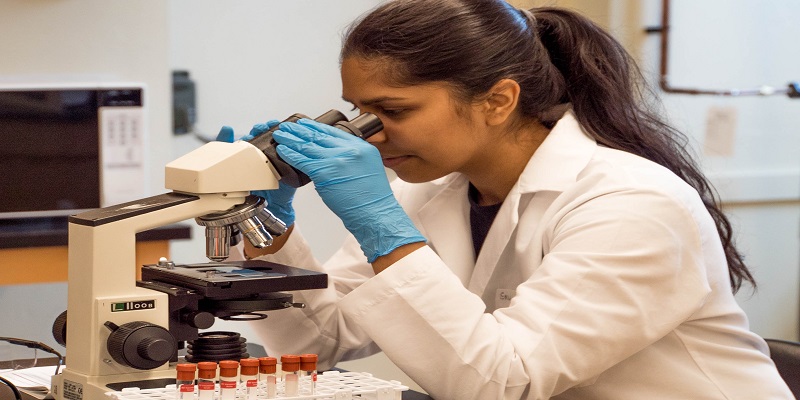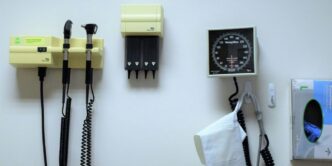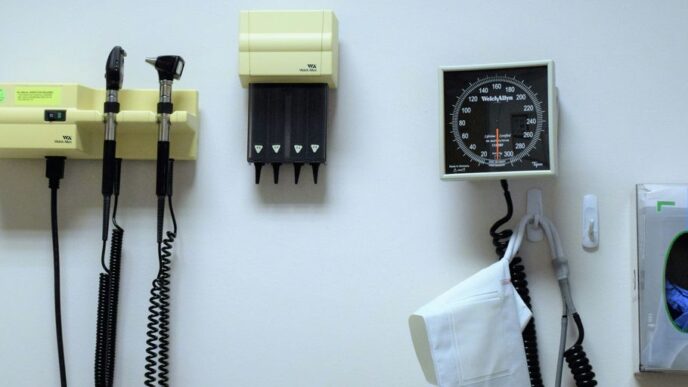From decoding the mysteries of our DNA to uncovering innovative treatments for diseases, genomics is transforming healthcare as we know it. In recent years, advances in sequencing technology and analytical tools have ushered in a new era of personalization and precision medicine. With the potential to diagnose rare genetic disorders before symptoms appear or create personalized therapies tailored to an individual’s genomic makeup, genomics represents a powerful tool that can improve patient outcomes and revolutionize medical research. In this blog post, we explore the evolution and implications of genomics in healthcare and discuss how this rapidly evolving field is shaping the future of medicine.
What is Genomics?
The term “genomics” was first coined in 1986 by Hoffman and Witkowski, and is defined as “the study of the genomes of organisms”. Genomics is an interdisciplinary field of science that combines biology, computer science, mathematics, and statistics to analyze and interpret an organism’s genome.
A genome is an organism’s complete set of DNA, including all of its genes. Each gene contains the instructions needed to build a particular protein. Proteins are responsible for the structure and function of all living cells. The human genome contains about 3 billion base pairs of DNA and about 20,000 genes.
Scientists began sequencing genomes in the 1970s, but it was not until the 1990s that genomic technologies really began to take off. In 2003, the Human Genome Project (HGP) announced that they had successfully mapped out the entire human genome. This was a monumental achievement that has opened up new doors in biomedical research.
Today, genomic technologies are being used to identify genetic risk factors for disease, develop new diagnostic tests and treatments, and even customize treatments to a person’s unique genetic profile. As sequencing costs continue to drop and our understanding of genomes grows, genomics is poised to revolutionize healthcare in the 21st century.
History and Evolution of Genomics
The Human Genome Project, which mapped the entire human genome, was completed in 2003. This project spurred advances in genomics research and subsequent projects sequenced the genomes of other species. The term “genomics” was first coined in 1986 by Scottish scientist Dr. Alec Jeffreys.
Genomics isdefined as the study of genes and their function. It encompasses all aspects of gene structure and function, including the sequencing of genomes, the identification of genes, and the analysis of gene expression. The advent of next-generation sequencing technologies has made genome sequencing more affordable and quicker, resulting in an explosion of genomic data.
There are many potential applications of genomics in healthcare, including precision medicine, disease risk prediction, and drug development. Precision medicine is an emerging field that uses a person’s genetic information to tailor treatment plans to their individual needs. Currently, only a small percentage of diseases can be treated with precision medicine approaches, but as more is learned about the genetics of disease, this number is expected to grow.
Disease risk prediction is another way that genomics can be used in healthcare. By looking at a person’s genetic information, doctors may be able to identify those at risk for developing certain diseases before they show any symptoms. This allows for earlier intervention and may prevent the development of some diseases altogether. Genomics can be used in drug development. Drug development traditionally involved trial-and-error approaches
Benefits of Utilizing Genomics in Healthcare
The use of genomics in healthcare allows for the identification of disease-causing genes and the development of targeted treatments. In addition, genomic data can be used to predict an individual’s response to a particular medication. Personalized medicine is a rapidly growing area of healthcare that is made possible by genomics.
Another benefit of using genomics in healthcare is population health management. Population health refers to the health of a group of people, usually defined by geography. Genomic data can be used to identify patterns and trends in disease occurrence and help target public health interventions.
Furthermore, genomics can be used in research to gain a better understanding of the biology of diseases and to develop new diagnostic tools and treatments. For example, genomic data was used to identify the gene responsible for cystic fibrosis, which led to the development of targeted therapies for this disease.
There are many potential benefits of utilizing genomics in healthcare. However, it is important to note that there are also some challenges associated with its use. These include issues related to privacy and consent, as well as the costs associated with collecting and storing large amounts of genomic data
Implications of Genomics in Personalized Medicine
The study and application of genomics have led to a new era of personalized medicine, in which healthcare is tailored to the individual. From diagnosis and treatment to disease prevention, genomics is revolutionizing how we care for our health. Here are just a few examples of how genomics is transforming medicine:
- More accurate diagnoses: By looking at a person’s DNA, doctors can more accurately identify the cause of a disease or condition. This allows for more targeted and effective treatments.
- Improved treatments: By understanding the genetic cause of a disease, scientists can develop targeted therapies that are more likely to be effective. Genomic research is also leading to the development of personalized medicines, such as cancer drugs that are designed specifically for a person’s unique genetic makeup.
- Disease prevention: Genomics can be used to identify people who are at risk for certain diseases before they ever experience symptoms. This allows for earlier intervention and potentially prevents the onset of the disease altogether.
- Enhanced drug safety: One of the biggest concerns with any medication is its potential side effects. By looking at a person’s DNA, doctors can more accurately predict who will experience side effects from a particular drug. This information can then be used to tailor the dose or even choose an alternative medication

Privacy and Security Concerns with Storing Genetic Data
As the field of genomics evolves, so too do the privacy and security concerns associated with storing genetic data. With the advent of direct-to-consumer genetic testing and whole genome sequencing, more and more individuals are sharing their genetic information with third-party companies. While these companies often have strict policies in place to protect user data, there have been several instances where genetic data has been leaked or stolen.
In 2015, the personal genetics company 23andMe was the victim of a data breach that exposed the email addresses and account information of more than 2 million customers. In 2018, another direct-to-consumer genetic testing company, MyHeritage, suffered a data breach that affected more than 92 million users. And just last year, FamilyTreeDNA revealed that it had shared user data with the FBI without consent.
These incidents highlight the importance of ensuring that your genetic data is stored securely. When considering a direct-to-consumer genetic test, be sure to check out the company’s privacy policy to see how they plan to protect your information. And if you are concerned about law enforcement accessing your genetic data, you can opt out of having your DNA uploaded to public databases such as GEDmatch.
Ethical Considerations When Using Genomic Data
When we think about the implications of genomic data in healthcare, it’s important to consider the ethical implications as well. After all, this data can be used to make decisions about someone’s health that could have a major impact on their life. There are a few key ethical considerations to keep in mind when using genomic data in healthcare:
1) Who owns the data? This is an important question to consider because it will determine who has control over what happens to the data. If the patient owns the data, they should be able to decide what happens to it and who has access to it. However, if the healthcare provider owns the data, they may have more control over how it’s used.
2) How will the data be used? It’s important to consider how the genomic data will be used before collecting it. Will it be used for research purposes? Will it be used to make decisions about a patient’s treatment? It’s important to make sure that all parties involved are clear about how the data will be used before collecting it.
3) Who has access to the data? Once again, this comes down to who owns the data. If the patient owns the data, they should be able to decide who has access to it. However, if the healthcare provider owns the data, they may have more control over who has access to it.
4) How will the data be protected? This is an important consideration because genomic data can contain genetic threats which can be easily used against the patient in the future. In other words,Medical data should be protected through robust encryption, secure storage systems, strict access controls, adherence to privacy regulations, and continuous monitoring for potential breaches or unauthorized access attempts.
The Challenges and Opportunities Ahead for the Field of Genomics
The field of genomics is currently facing a number of challenges that threaten its future growth and development. These challenges include the following:
1) The cost of sequencing a human genome has fallen dramatically in recent years, but it still remains too expensive for most people to afford. This means that the majority of people who could potentially benefit from genomic testing are still unable to access it.
2) There is a lack of accessible data on the clinical utility of genomic testing. This lack of data makes it difficult for physicians to know when and how to use genomic testing in their practice.
3) There is a lack of trained personnel who are able to interpret genomic test results and advise patients on what they mean. This shortage limits the ability of healthcare providers to offer genomic testing to their patients.
Despite these challenges, there are also a number of opportunities that exist in the field of genomics. These include the following:
1) The development of new technologies that make sequencing faster and cheaper. This could make genomic testing more accessible to more people.
2) The creation of databases that collect data on the clinical utility of genomic testing. This would help healthcare providers make better decisions about when and how to use genomic testing in their practice.
3) The training of more personnel who are able to interpret genomic test results and advise patients on what they mean. This would allow more healthcare providers to offer genomic testing to their patients.
Conclusion
In conclusion, genomics and its implications for healthcare are an ongoing field of study. From personalized medicine to the analysis of complex diseases, the evolution of this technology holds great potential for improving patient outcomes. With continued innovation and research into genomic sequencing technologies, we can expect to see more targeted options become available that will help us better understand how our bodies are faced with various health challenges. This understanding may ultimately lead to more effective treatments and improved quality standards in healthcare settings across the world.













